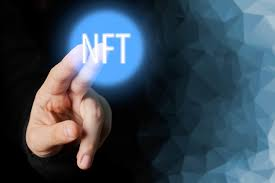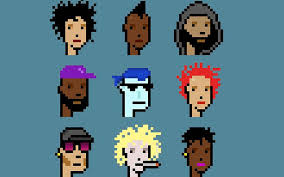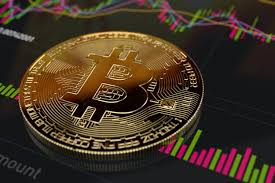The Digital Revolution: NFTs Everyone is discussing Consider this: You're browsing Instagram when you come upon an incredible work of digital art. "I wish I could own this and prove it's mine," you think. Well, you can because of NFTs.Non-Fungible Tokens (NFTs) are transforming the digital world by enabling the online ownership and trading of unique products, similar to purchasing rare collector's items without the need for a physical shelf to show them.
What’s an NFT Anyway? Alright, let’s break it down. NFTs are digital tokens that prove ownership of something unique, like artwork, music, or even a piece of virtual real estate. Ethereum is the big player here when it comes to NFTs because it has these rules (called standards or something like that) that make creating and trading NFTs pretty easy. The whole point is, once you own an NFT, no one can mess with your record. It’s officially yours.
The Tech That Makes NFTs Tick The magic behind NFTs is blockchain technology. Think of blockchain as an unhackable diary where every page records a transaction. Ethereum is the most popular blockchain for NFTs because it has specific rules (called standards) that make creating and trading these digital assets a breeze. In short, blockchain ensures no one can mess with your ownership record—it’s yours and only yours. Art and NFTs: A Perfect Match This is where things start to get fascinating, especially for art lovers. Before NFTs, digital artists had trouble confirming the uniqueness of their work. If someone snapped a screenshot of their innovations, the game was over. However, artists can now sell their work with a digital stamp that essentially shouts, "This is the real deal!" thanks to NFTs.
And get this—artists can even program their NFTs to pay them royalties every time the piece is resold. Like, imagine creating one digital artwork and getting paid over and over whenever it changes hands. Beeple, a digital artist, made headlines when his NFT artwork “Everydays: The First 5000 Days” sold for a jaw-dropping $69 million. It’s like the Mona Lisa of NFTs—except you can’t hang it on your wall.
Gamers, NFTs Are Changing Your World Too. This section will be particularly relevant to gamers. Have you ever spent hours grinding to obtain a rare weapon or skin in a game only to discover that you don't really possess it? NFTs can help with that. They allow you to actually possess in-game stuff. You can trade or sell them outside of the game in addition to using them in it. Take Axie Infinity, for example. Players collect and battle little digital creatures called Axies, some of which sell for thousands of dollars. It’s like Pokémon, but with real money involved. Plus, this “play-to-earn” model lets gamers make actual cash from their virtual adventures. NFTs Are Everywhere NFTs aren’t just for art and gaming—they’re popping up in all sorts of unexpected places: Gamers, This One’s for You If you’re into gaming, NFTs are basically changing the game—literally. Have you ever spent hours in a game grinding to obtain a rare weapon or skin only to discover it isn't truly yours? Yes, that is awful. That is fixed by NFTs. You can now trade or sell in-game objects outside of the game in addition to actually owning them.
Sports Collectibles: Anyone may purchase digital recordings of LeBron James' dunking on websites like NBA Top Shot. You can truly relive the event, which makes it far more fantastic than trading card collecting. Virtual Real Estate: Yep, people are buying land in digital worlds like Decentraland.You can use your digital plot as an investment to create virtual homes, start stores, or simply keep it.Who believed Monopoly to be real? Musicians are also embracing the NFT campaign, according to the media. As an NFT, Kings of Leon released an album with advantages such as first access to performances. It's a novel way for musicians to communicate with their fans and make more revenue.The Barriers That Remain Of course, it's not always that easy.What’s clear is that NFTs are more than just a trend—they’re changing how we think about ownership in the digital age. Who would have thought Monopoly was real? Media and Music: Musicians are also joining the NFT movement. As an NFT, Kings of Leon issued an album with benefits including first dibs at concerts. It's a fresh approach for musicians to interact with their fans and earn extra money. The Obstacles in the Way Of course, things aren't always easy. NFTs have several problems:
Energy Use: Blockchain transactions can use a ton of energy, raising concerns about their environmental impact. Luckily, new tech like Ethereum’s proof-of-stake is making things greener. Volatility: The NFT market is like a rollercoaster. One day, your NFT is worth thousands; Energy consumption: There are worries regarding the potential environmental impact of blockchain transactions due to their high power consumption. Fortunately, innovative technologies like Ethereum's proof-of-stake are helping to make things more environmentally friendly. Like a roller coaster, the NFT market is erratic. Your NFT could be worth hundreds of dollars one day and nothing the next. Therefore, consider the dangers when making a purchase. Copyright Drama: You do not necessarily own the rights to the underlying object just because you own an NFT. You keep the poster but not the movie, so it's like buying an autographed poster. What’s Next for NFTs? The NFT world is still evolving, and who knows what’s next? Maybe you’ll own a piece of a blockbuster movie, or perhaps your favorite band will drop an NFT-exclusive album.What is evident is that NFTs are more than simply a fad; they are transforming how we think about ownership in the digital era. Who would have guessed that Monopoly was real? Musicians have also joined the NFT movement. As an NFT, Kings of Leon released an album with privileges such as first access to performances. It's a novel way for musicians to connect with their fans and make extra money. The Barriers in the Way However, things are not always easy. NFTs have a few issues:
Energy Use: Blockchain transactions can consume a significant amount of energy, generating questions about their environmental impact. Fortunately, new technologies, such as Ethereum's proof-of-stake, are making things greener. Volatility: The NFT market resembles a rollercoaster. One day, your NFT is worth thousands.
Copyright Drama: Owning an NFT doesn’t always mean owning the rights to the underlying asset. It’s like buying a signed poster—you own the poster, but not the movie. What’s Next for NFTs? The NFT world is still evolving, and who knows what’s next? Maybe you’ll own a piece of a blockbuster movie, or perhaps your favorite band will drop an NFT-exclusive album. What’s clear is that NFTs are more than just a trend—they’re changing how we think about ownership in the digital age. Energy Use: Blockchain transactions can use a ton of energy, raising concerns about their environmental impact. Luckily, new tech like Ethereum’s proof-of-stake is making things greener. Volatility: The NFT market is like a rollercoaster. One day, your NFT is worth thousands; the next, it’s worth peanuts. So, if you’re buying, know the risks. Copyright Drama: Owning an NFT doesn’t always mean owning the rights to the underlying asset. It’s like buying a signed poster—you own the poster, but not the movie. What’s Next for NFTs? The NFT world is still evolving, and who knows what’s next? Maybe you’ll own a piece of a blockbuster movie, or perhaps your favorite band will drop an NFT-exclusive album. What’s clear is that NFTs are more than just a trend—they’re changing how we think about ownership in the digital age.
So, whether you’re an artist, a gamer, or just someone curious about what’s next, NFTs are worth exploring. Who knows? You might end up owning a digital treasure or even creating one yourself.











